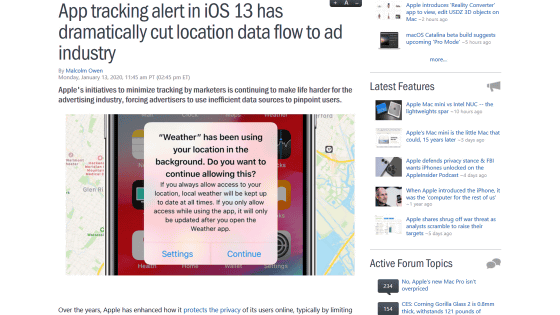iOS 13's `` notify location tracking app '' feature dramatically reduces location data used by advertising companies

by
Apple values user privacy and Tim Cook has a strict privacy policy that states, 'iPhone data will not be 'cashed'.' Apple's iOS 13 'notify apps that track location information in the background' feature has reported that many advertising companies are struggling to collect location data.
Apple's new privacy features have further rattled the location-based ad market-Digiday
https://digiday.com/marketing/apples-new-privacy-features-rattle-location-based-ad-market/
App tracking alert in iOS 13 has dramatically cut location data flow to ad industry
https://appleinsider.com/articles/20/01/13/app-tracking-alert-in-ios-13-has-dramatically-cut-location-data-flow-to-ad-industry

Apple, which emphasizes user privacy protection, has a tracking prevention function called ``
Apple's impact on the advertising industry isn't limited to ITP's prevention of user tracking. iOS 13 is equipped with a function that periodically notifies users of apps that are always allowed to use location information, and prompts them to review their settings . Users can opt out of background tracking in the background, and have the option to allow location tracking only when the app is open, and many users refuse background tracking in the background It seems to have become.
According to Digday , an online magazine for advertising and media, about 70% of iPhone users tracked by a company called Location Sciences, which verifies location data, update to iOS 13 within six weeks of its release. , 80% of iOS 13 users have stopped tracking background location in all apps. 'People have decided to stop sharing location data on smartphones at a universal level,' said Jason Smith, Chief Operating Officer of Location Sciences.

by
Benoit Grouchko, who runs Teemo , a provider of location-based online advertising, says that around 2016, the percentage of users who allowed location tracking by apps they weren't using was close to 100%. However, this figure is because many users did not recognize the option of `` refusing location tracking by apps not in use '', so at the time of article creation, more than half of the users tracked location information in the background He refuses.
Paul Kasamias , an operating partner at media agency Starcom , points out that the growing tendency to refuse tracking by advertising companies has made it difficult for companies to measure the effectiveness of various campaigns. It seems that the percentage of users who collect information online and purchases in physical stores is becoming difficult to understand, and the effects of advertising are becoming unclear. Kasamias believes that this will likely result in Internet advertising spending reductions, especially by small and medium-sized advertisers.
While the reduction of location data sharing by Apple is progressing, the value of available location data is increasing, and the market size of location data is continuing to grow. Even so, it seems that the quality of location data is adversely affected, and in the past, although many “highly accurate location data” by smartphone GPS were available, in recent years it has been sourced from telecommunications carriers and other Internet protocols, Smith said that 'low-precision location data' was on the rise.

Related Posts:






